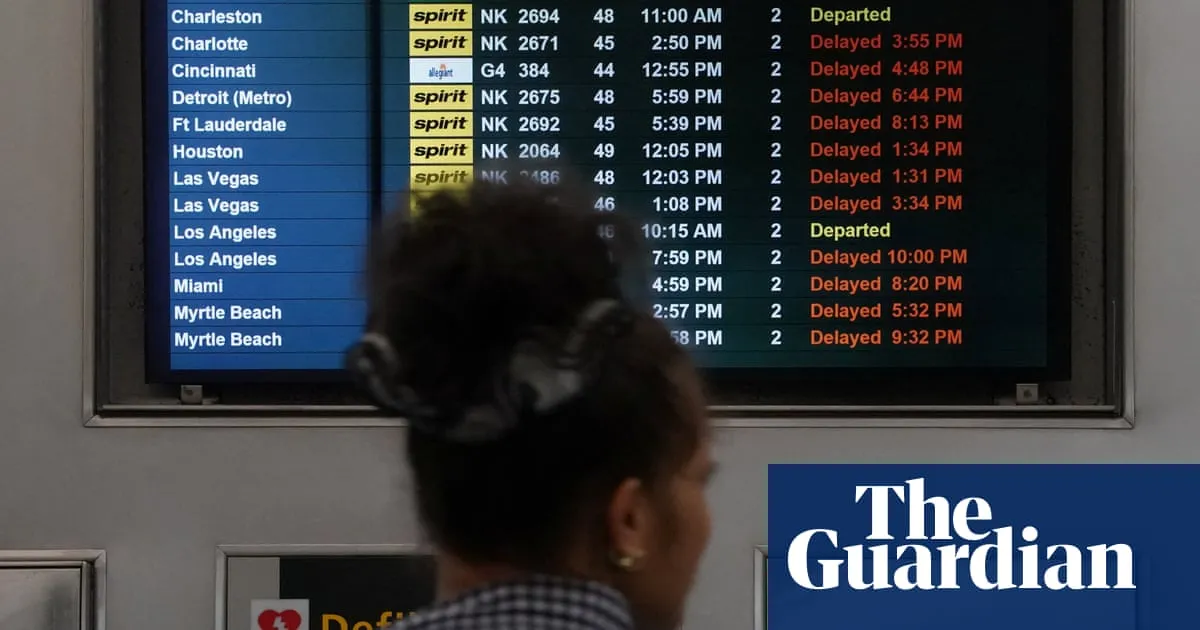
The US Transportation Secretary, Sean Duffy, has announced plans to temporarily reduce the number of flights in and out of Newark Liberty International Airport for the “next several weeks.” This decision comes as one of the country’s busiest airports grapples with significant challenges, including radar outages, numerous flight delays, and cancellations, primarily attributed to a severe shortage of air traffic controllers.
In a recent appearance on NBC’s Meet the Press, Duffy stated that he would convene a meeting with all airlines operating out of Newark this week to discuss the necessary flight reductions. He emphasized that these reductions would vary, with a more substantial decrease expected during the afternoons when international flight arrivals peak, exacerbating congestion at this crucial hub serving the New York City area.
“We want to ensure that if you book your flight, you can be confident it will take off,” Duffy remarked. “That is our top priority. We don’t want passengers arriving at the airport only to wait four hours for a flight that ends up being delayed.”
The Federal Aviation Administration (FAA) reported that the radar at the facility in Philadelphia, which directs planes in and out of Newark, experienced a significant outage when it went dark for 90 seconds at 3:55 AM on Friday. This incident is reminiscent of a similar occurrence on April 28. Additionally, a separate air traffic control equipment failure on Sunday morning led the FAA to implement a ground stop for Newark flights lasting approximately 45 minutes, as highlighted by CNN transportation reporter Pete Muntean in an X post that referenced an advisory from the air traffic control system command center.
Since mid-April, Newark has averaged 34 arrival cancellations per day, according to FAA data. Furthermore, the number of flight delays has been on the rise, increasing from an average of five in the mornings to 16 by the evening. These delays typically last between 85 to 137 minutes, adding to the frustration of travelers.
In response to these ongoing challenges, the Trump administration has proposed a comprehensive multibillion-dollar overhaul of the US air traffic control system. This plan includes the establishment of six new air traffic control centers, along with upgrades to technology and communications across all national air traffic facilities over the next three to four years.
During his Sunday address, Secretary Duffy also shared his strategy to combat the shortage of approximately 3,000 air traffic controllers. His proposals include raising the mandatory retirement age for these professionals from 56 to 61 and offering a 20% upfront bonus as an incentive to encourage controllers to remain in their positions. However, he noted that many controllers choose to retire after 25 years of service, often around the age of 50.
“These are not overnight fixes,” Duffy acknowledged. “However, as we bring in older, more experienced personnel and younger individuals enter the workforce, we can bridge that 3,000-person gap.”
When asked about the safety of flying in and out of Newark amidst these ongoing issues, United Airlines CEO Scott Kirby, whose company utilizes Newark as a hub, assured travelers that it is indeed safe. “It absolutely is,” he stated firmly. “When these kinds of outages occur, we are trained to handle them. We have backup procedures in place, along with backups to those backups, to ensure the safety of the skies, which remains our utmost priority.”